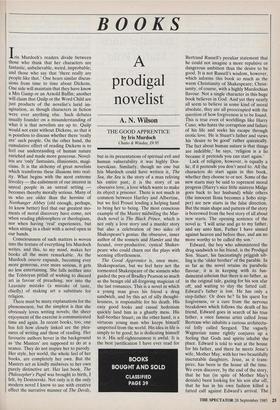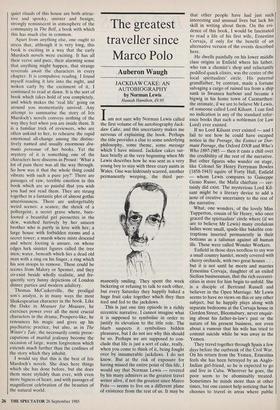BOOKS
A prodigal novelist
A. N. Wilson
THE GOOD APPRENTICE by Iris Murdoch
Chatto & Windus, f9.95
Iris Murdoch's readers divide between those who think that her characters are fantastic, unbelievable, weird, improbable; and those who say that 'there really are people like that.' One hears similar discus- sions from time to time about Dickens. One side will maintain that they have know a Mrs Gamp or an Arnold Baffin; another will claim that Qui1p or the Word Child are just products of the novelist's lurid im- agination, as though characters in fiction were ever anything else. Such debates usually founder on a misunderstanding of what it is that novelists are up to. Qui1p would not exist without Dickens, so that it is pointless to discuss whether there 'really are' such people. On the other hand, the cumulative effect of reading Dickens is to feel our understanding of human nature enriched and made more generous. Novel- ists are 'only' fantasists, illusionists, magi- cians. It is the alchemy of great novelists which transforms these illusions into real- ity. What begins with the most extreme frivolity — the enlistment of our interest in unreal people in an unreal setting becomes thereby morally serious. Many of us who are older than the heroine of Northanger Abbey (old enough, perhaps, to know better) feel that our greatest mo- ments of moral discovery have come, not when reading philosophers or theologians, nor when having 'real' experiences, but when sitting in a chair with a novel open in our hands.
Consciousness of such matters is woven into the texture of everything Iris Murdoch writes, and this, to my mind, makes her books all the more remarkable. As the Murdoch oeuvre expands, becoming ever more generous, ever more serious, it gets no less entertaining. She falls neither into the Tolstoyan pitfall of wishing to discard art in favour of preaching; nor into the Leavisite mistake (a mistake of taste, chiefly) of making art a substitute for religion.
There must be many explanations for the phenomenon, but the simplest is that she obviously loves writing novels; the sheer enjoyment of the exercise is communicated time and again. In recent books, too, one has felt how closely linked are the plea- sures of writing and those of reading. Her favourite authors hover in the background as `the Masters' are supposed to do at a seance. They do not inspire her to parody. Her style, her world, the whole feel of her books, are completely her own. But the Masters act as kindly midwives to her own purely distinctive art. Her last book, The Philosopher's Pupil was brought to birth, I felt, by Dostoevski. Not only is it the only modern novel I know to use with creative effect the narrative manner of The Devils, but in its presentations of spiritual evil and human vulnerability it was highly Dos- toevskian. Similarly, though no one but Iris Murdoch could have written it, The Sea, the Sea is the story of a man reliving his entire past; it is the story of an obsessive love, a love which wants to make its object a prisoner. There is not much in common between Hartley and Albertine, but we feel Proust lending a helping hand to bring her to being. The most conscious example of the Master midwifing the Mur- doch novel is The Black Prince, which is not only a love story and a murder story but also a celebration of two sides of Shakespeare's genius: the obsessive, inner author of the sonnets and Hamlet and the fecund, over-productive, cynical Shakes- peare who could churn out the plays with seeming effortlessness.
The Good Apprentice is, once more, Shakespearian, but we feel here not the tormented Shakespeare of the sonnets who guided the pen of Bradley Pearson so much as the benign old all-forgiving magician of the last romances. This is a novel in which a young man gives his friend a drug sandwich, and by this act of silly thought- lessness, is responsible for his death. His easy good looks and casual hedonism quickly land him in a ghastly mess. His half-brother Stuart, on the other hand, is a virtuous young man who keeps himself unspotted from the world. His idea in life is simply to be good; he is dedicating himself to it. His self-righteousness is awful. It is the best justification I have ever read for Bertrand Russell's peculiar statement that he could not imagine a more repulsive or dangerous ambition than the desire to be good. It is not Russell's wisdom, however, which informs this book so much as the warm Christianity of Shakespeare; Christ- ianity, of course, with a highly Murdochian flavour. Not a single character in this huge book believes in God. And yet they nearly all seem to believe in some kind of moral absolute, they are all preoccupied with the question of how forgiveness is to be found. This is true even of worldlings like Harry Cuno, who hates the corruption and failure of his life and seeks his escape through erotic love. He is Stuart's father and views his `desire to be good' rather quizzically. The fact about human nature is that things are indelible,' he says, 'religion is a lie because it pretends you can start again.'
Lack of religion, however, is equally a lie, if it pretends you don't need to. All the characters do start again in this book, whether they choose to or not. Some of the new starts may be said to represent moral progress (Harry's nice little mistress Midge goes back to her husband) while others (the innocent Ilona becomes a Soho strip- per) are new starts in the false direction. But the main shape and pattern of the story is borrowed from the best story of all about new starts. The opening sentence of the novel is: 'I will arise and go to my father, and say unto him, Father I have sinned against heaven and before thee, and am no more worthy to be called thy son.'
Edward, the boy who administered the drug sandwich to his friend, is the Prodigal Son. Stuart, his fascinatingly priggish sib- ling is the `older brother' of the parable. In so far as the novel retains its parabolic flavour, it is in keeping with its fun- damental atheism that there is no father, as in the original tale, gazing for his son afar off, and waiting to slay the fatted calf. Edward's father is lost. He has only a step-father. Or does he? In his quest for forgiveness, or a cure from the nervous breakdown which follows the death of his friend, Edward goes in search of his true father, a once famous artist called Jesse Bertram who inhabits a curious architectu- ral folly called Seegard. The vaguely Wagnerian name rightly conjures up a feeling that Gods and spirits inhabit the place. Edward is told to wait at the house for his father, and there he meets Jesse's wife, Mother May, with her two beautifully inscrutable daughters. Jesse, as it trans- pires, has been in the house all the time. We even discover, by the end of the story, that he has (in spite of Mother May's denials) been looking for his son afar off, that he has in his own fashion killed a fatted calf against Edward's arrival. The quiet rituals of this house are both attrac- tive and spooky, sinister and benign; strongly reminiscent in atmosphere of the community in The Bell, a book with which this has much else in common.
Apart from anything else, one ought to stress that, although it is very long, this hook is exciting in a way that the early Murdoch novels were exciting. It has all their verve and pace, their alarming sense that anything might happen, that strange reversals await the characters in every chapter. It is compulsive reading. I found myself reading it late into the night, and woken early by the excitment of it, I continued to read at dawn. It is the sort of book which takes hold of you completely, and which makes the 'real life' going on around you momentarily unvivid. Any attempt to summarise the story of Iris Murdoch's novels conveys nothing of the way they feel when you are inside them. It is a familiar trick of reviewers, who are often unkind to her, to rehearse the rapid emotional all-change among the distinc- tively named and usually enormous dra- matis personae of her books. Yet the mystery of it is something one of the characters here discerns in Proust: 'What a lot of pain there was all the way through. So how was it that the whole thing could vibrate with such a pure joy?' There are passages of raw, terrible emotion in this book which are so painful that you wish you had not read them. They are strung together in a fantastic plot of almost gothic unseriousness. There are unforgettably weird scenes: a seance; the shriek of a poltergeist; a secret grave where, bare- footed a beautiful girl pirouettes in the dew, watched furtively by her unseen brother who is partly in love with her; a large house with forbidden rooms and a secret tower; a marsh where mists descend and where footing is unsure, on whose edges lurk sinister figures called the tree men; water, beneath which lies a dead old man with a ring on his finger, a ring which his son stoops to remove. These could be scenes from Malory or Spenser, and they co-exist beside wholly realistic, and fre- quently very funny depictions of London dinner parties and modern adultery.
Thomas McCaskerville, the prodigal son's analyst, is in many ways the most Shakespearian character in the book. Like the Duke in Measure for Measure, he exercises power over all the most crucial characters in the drama; Prospero-like, he renounces his magic and gives up his psychiatric practice; but also, as in The Winter's Tale, the necessarily comic preoc- cupations of marital jealousy become the occasion of large, warm forgiveness which extends much further than the confines of the story which they inhabit.
I would say that this is the best of Iris Murdoch's novels. She does here things which she has done before, but she does them more stylishly than ever, with even more bigness of heart, and with passages of magnificent celebration of the beauties of the natural world.















































 Previous page
Previous page